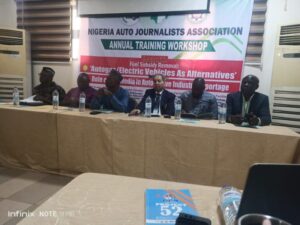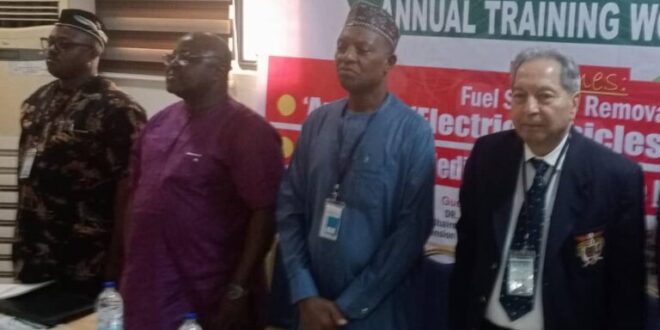 As Nigerians continue to lament the harsh realities and effects of removal of subsidy on petrol, especially on transportation and the economy in general, stakeholders in the Transport and Energy Sectors have identified gas as a ready alternative but lament the high cost of conversion of vehicles from Petroleum Premium Spirit (PPMS) to gas (CNG and LPG).
As Nigerians continue to lament the harsh realities and effects of removal of subsidy on petrol, especially on transportation and the economy in general, stakeholders in the Transport and Energy Sectors have identified gas as a ready alternative but lament the high cost of conversion of vehicles from Petroleum Premium Spirit (PPMS) to gas (CNG and LPG).
President Bola Tinubu on May 29, 2023 announced the immediate removal of subsidy on PPMS leading to over 500 per cent hike on the price of the product and an increase on transportation.
Industry experts who spoke at the Nigeria Auto Journalists Association (NAJA) 2023 annual training workshop held in Lagos recently, with the theme ‘Fuel Subsidy: Autogas/Electric Vehicles As Alternatives’, agreed that gas has no doubt become the way to go as an alternative to fuel – Petroleum Premium Spirit (PPMS) especially in the transport and logistic chain of the economy.
They however said financing conversion of petrol engine vehicles to gas is a major challenge as this comes at a very huge cost.
CEO/Founder, Creek Transitway Limited, an energy company developing natural gas solutions for Transport and Power Sectors, Mr. Elijah Wisdom, said financing for conversion is a challenge because the operators do not have the initial capital to convert their petrol vehicles to gas..
Conversion from PPMS to CNG, according to him, comes at an average cost of N300,000 to N350,000 which most transporters would not be able to pull out at a go, noting that the movers of the economy are public transport operators; the likes of the tricycle (keke) operators, taxi and buses who are actually having a direct impact on the economy.
To tackle this, he said his Company has built a model that enables transporters to convert their vehicles and pay in instalments, adding that the company is seeking collaborations and guarantees from the government, especially of the different states.
“We built a finance model where you convert and repay over a period of one year and with that, the cost of transportation can come down.
“With the CNG adoption we want the government to stand as guarantors to propel finance institutions to fund conversion. We’re not asking the government for money but to guarantee.
“The government is already pushing for conversion to gas but the challenge is the implementation. Funding is needed to implement this. The gas expansion fund is actually domiciled with the Central Bank of Nigeria (CBN) but now the rules the CBN gave to access the fund is stringent,” he explained.
Elijah disclosed that his Company is seeking collaboration with states and also showing the states they can diversify their revenue if they invest in the CNG value chain. He stressed that every investor in conversion would enjoy a return in investment.
“To convert 1,000 keke would cost N350 million and in some states, you have a minimum of 30,000, also taxis and buses are in huge numbers,” he stated .
He lamented that some people have been trained on the skill of conversion of vehicles that run on PPMS to CNG but the inability to pay for conversion remains the hindrance.
He said: “It’s not about conversion but to be able to pay back. We need to have chains to start converting. We have an end to end solution we have built to ensure that every investor would not have its investment go down.”
Elijah allayed fears on conversion cost, saying conversion is quite expensive now because Nigeria is not manufacturing any of the kits locally but would come down when kits are manufactured locally.
“We’re looking at a company that can set up a conversion kit centre using local materials to reduce cost,” he disclosed.
Also speaking on speaking on funding as a bane to conversion of vehicles from petrol to gas, the Executive Chairman & Founder of Funtay, Engineer Olufunso Amoo, said transportation is the Company’s major issue; keke, minibus (korope) and others, adding that the problem is not that of offtakers but financing.
However, he said his Company is already working with some banks to ensure vehicles are converted, stating that 300 kekes can be converted in three months if the full money is paid.
Amoo advised motorists to seek funding elsewhere rather than rest on their oars and waiting for the government. He said Funtay is already seeking collaborations in this regard.
“Where we are now is that we have a lot of yearning for alternative fuel but being deceived by the belief that the government is bringing financing; better go to get a place where you can get finance for 30 per cent than wait for the government’s 9 per cent.
“We need to find a local solution for financing rather than wait for the government, the government itself is struggling. Let’s be creative; talk with union leaders, go to one localised area, finish with them and go to another one,” Amoo advised.
The Chairman, National Gas Expansion Programme (NGEP), Dr. Mohammed M. Ibrahim, corroborated that it is a fact that gas is where to go to, disclosing that already 9,000 out of 10,000 filling stations in Nigeria have qualified to become multi-fuel stations where vehicle owners can refuel for autogas and petrol.
He said: “Under NGEP, we have what we call the multi-fuel scheme whereby we do not intend to shut down the current petrol stations that we have in the country, about 10,000 of them and like I said earlier, we have carried out an audit whereby 9,000 out of 10,000 qualify to retrofit to become multi-fuel.
“So what is going to happen and we have a couple already in the system, is you drive into a filling station, you are going to have dispensing facilities for your petrol, diesel, and kerosene but in addition you are going to have the dispensing facilities with the cryogenic tower that enables you to have access to LNG and also a dispensing pump for CNG and also a charging point for your electric vehicles.
“So it becomes a multi-fuel retail outlet that enables you to have access to LNG for your thrust long hauls, CNG for your 300km maximum and the conventional petrol, diesel and kerosene.”
 ..:: AUTO REPORT AFRICA ::..
..:: AUTO REPORT AFRICA ::..




